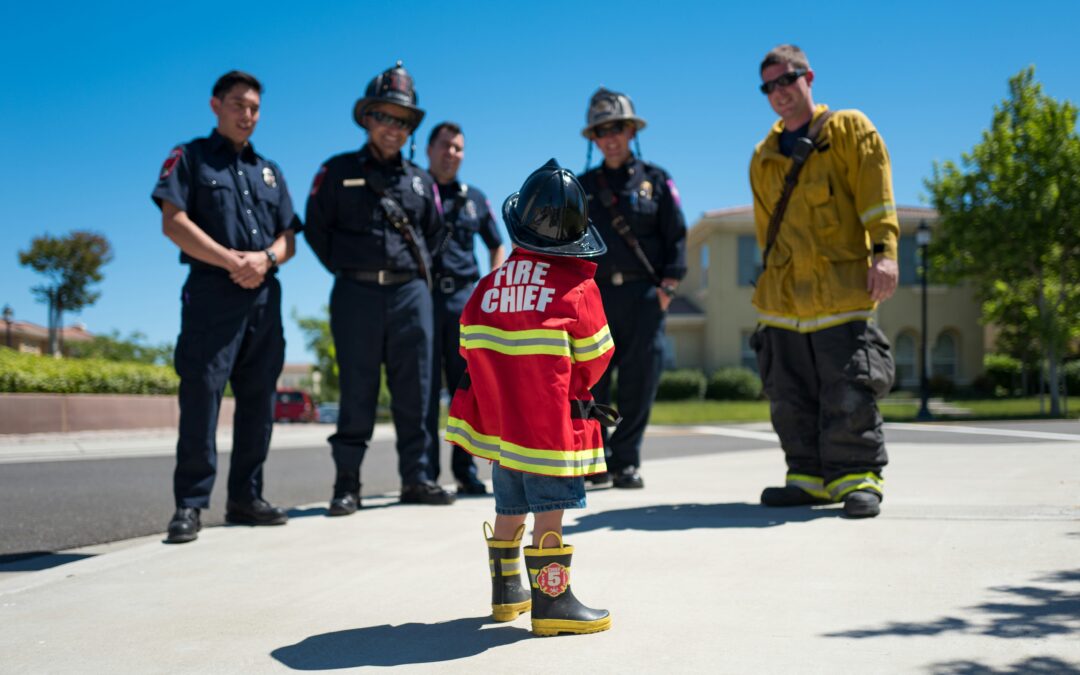If you’re a parent working as a police officer, firefighter, paramedic, or other first responder, your work is more than just a job, it’s a calling. You’ve seen the best and worst of humanity, sometimes all in the same shift. And while you signed up to serve and protect, you didn’t sign your children up for the emotional weight that can come with it.
Yet kids are curious. They notice when you come home late, tired, distracted, or carrying the heaviness of the day. They hear snippets of adult conversations, catch news reports, or see changes in your mood. Naturally, they want to know: “What happened today?”
As a loving parent, you want to be honest—but you also want to protect them from the burden of trauma. The good news? It’s absolutely possible to share about your work in a way that builds trust and connection, without passing along the emotional wounds.
This guide offers practical, evidence-based strategies to help you find that balance.
Why Kids Ask and Why It Matters How You Respond
Children ask about your work not just out of curiosity, but because it helps them understand their world and feel secure. According to developmental psychology, open and honest (but age-appropriate) communication supports emotional safety and resilience in kids (National Child Traumatic Stress Network, 2019).
When parents avoid the topic entirely, children may fill in the gaps with their imagination—which can often be scarier than the truth. On the other hand, sharing too much detail—especially about violence, loss, or danger—can lead to vicarious trauma, anxiety, and sleep issues (American Psychological Association, 2018).
The key is to find a “middle path” where your child feels informed and included, but not emotionally overwhelmed.
How to Talk About Your Work Without Passing on Trauma
- Know Your Child’s Developmental Stage
The way you explain your job should align with your child’s age and maturity.
- Ages 4–7: Focus on the helping role (“I help people when they’re hurt or in trouble”) without going into distressing details.
- Ages 8–12: Offer more context about challenges and safety measures, but keep descriptions general and hopeful.
- Teens: You can discuss more complex realities, but balance it with conversations about coping, resilience, and the bigger picture.
- Use “Big Picture” Language, Not Graphic Details
Instead of describing a traumatic event, frame it around the values and purpose of your work:
“Some people had a really hard day, and my job was to help keep them safe.”
This keeps the focus on safety, care, and community support—protecting them from mental images they don’t need.
- Regulate Yourself First
Children read your tone, body language, and emotional state even more than your words. If you’re visibly upset, take time to calm down before talking. You may believe that you need to be present for your family as soon as you have left work, however, a ritual for you to decompress may be advisable. It might include exercise, even a short walk can provide a transition from work to home. Depending upon the age of your children and if you have support from a partner you might choose to shower, meditate or listen to music before beginning your family time. This models healthy coping strategies and reassures your children you can manage your emotions (Siegel & Bryson, 2011).
- Give Them a Role in Your Self-Care
If your children are small you and you are the only adult caregiver, or they are old enough to be left but really want to interact with when you come home from a challenging shift, include your child in positive rituals—walking the dog, sharing a snack, listening to music. This shows that difficult days can be followed by connection and rest.
- Encourage Questions—But Respect Boundaries
It’s okay to say, “That’s part of my job I can’t talk about in detail, but I can tell you the important part…” This shows you value their curiosity while protecting their emotional wellbeing.
- Share Positive Stories Too
Balance difficult realities with uplifting examples—times you made a difference, helped someone in need, or worked as a team. These stories help kids see your work as both meaningful and hopeful.
The Psychological Benefits of Healthy Communication
Open but protective conversations can:
- Reduce anxiety in children by giving them a framework for understanding your absence or mood changes.
- Build emotional intelligence by modeling how to talk about feelings in a healthy way.
- Strengthen trust and attachment, which serve as protective factors against stress (Attachment Theory, Bowlby, 1988).
Signs Your Child May Be Absorbing Too Much
Watch for:
- Trouble sleeping or recurring nightmares.
- Increased clinginess or separation anxiety.
- Avoidance of places or situations linked to your work.
- New worries about your safety.
If these signs persist, consider consulting a child therapist familiar with trauma-informed care. Early support can prevent long-term stress responses.
You Can Protect and Connect
Being a first responder means navigating a world most people never see. Being a parent means nurturing a world your child can feel safe in. With intentional communication, emotional regulation, and a focus on hope and values, you can share about your work in a way that connects you to your child—without transferring the weight of trauma.
If you’d like more guidance on talking to your children about your work—or support in managing the emotional impact of your role—reach out to one of our therapists who understand the stressors for first responder and their families. Share this post with another parent who could use these tools today.
Reviewed and edited by Susan Packer RP, M-Div counselling (Registered Psychotherapist) at Finding Solutions Together.



Recent Comments